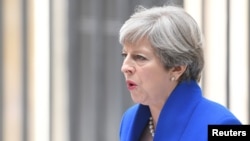British Prime Minister Theresa May was seeking a deal with a small Northern Irish party Sunday to stay in power after losing her party’s parliamentary majority in a catastrophic electoral gamble just days before Brexit talks are set to start.
But with May’s personal authority in tatters, there were reports that moves were afoot within her Conservative Party to dislodge her, while opposition Labour leader Jeremy Corbyn was insisting she could be ousted and he could replace her.
May’s Downing Street office said Sunday she had spoken with Northern Ireland’s pro-Brexit, socially conservative Democratic Unionist Party (DUP) to discuss finalizing a deal when parliament returns Tuesday.
“We will welcome any such deal being agreed, as it will provide the stability and certainty the whole country requires as we embark on Brexit and beyond,” Downing Street said in a statement.
“As and when details are finalized both parties will put them forward,” it said, referring to May’s Conservative Party and the DUP.
The timing is challenging, with Britain due to start negotiating the terms of its exit from the European Union with the bloc’s 27 other members on June 19.
The Conservatives won 318 House of Commons seats in Thursday’s election, eight short of an outright majority. Labour, the main opposition party, won 262. The DUP won 10.
Corbyn wants a chance
Labour’s Corbyn told the Sunday Mirror newspaper he saw a route to power himself, although it was not clear how he would command the support of a majority of members of parliament.
Labour’s tally, even when added to those of potential allies such as the Scottish National Party and other smaller parties, was still short of a majority.
“I can still be prime minister. This is still on. Absolutely,” Corbyn was quoted as saying.
He said his party would seek to vote down May’s Queen’s Speech, or program for government, when she presents it to parliament. If that succeeded, May would be expected to stand aside and let Corbyn try to win the backing of a majority of members of parliament to form a government.
Snap election decision
May had called the snap election with a view to increasing the narrow majority she inherited from her predecessor David Cameron. At the start of the campaign, she was enjoying poll leads of 20 points or more over the main opposition Labour Party.
But after a poor campaign and an unexpectedly stiff challenge from the opposition Labour Party under leader Jeremy Corbyn, her plan went disastrously wrong, leaving her unable to form a sustainable government without DUP support.
Brexit talks loom
The timing is challenging, with Britain set to start negotiating the terms of its exit from the European Union with the bloc’s 27 other members June 19.
The Conservatives now plan to reach a so-called confidence and supply agreement with the DUP, which would involve it supporting a Conservative minority government on key votes in parliament but not forming a formal coalition.
After an initial round of discussions, Downing Street had said Saturday that the “principles of an outline agreement” had been agreed with the DUP.
No deal with DUP yet
On Sunday, DUP leader Arlene Foster told Sky News that the talks were ongoing and that she would be traveling to London to meet May at her official Downing Street residence on Tuesday.
“We had very good discussions yesterday with the Conservative Party in relation to how we could support them in forming a national government, one that would bring stability to the nation and those discussions continue. We have made good progress but the discussions continue,” Foster said.
While that to-and-fro was unfolding, several British newspapers were reporting that some prominent Conservatives, including Foreign Secretary Boris Johnson and Brexit minister David Davis, were being urged by supporters to challenge May for the party leadership.
Johnson dismissed the reports as “tripe,” tweeting late Saturday that he was backing May.
The prime minister also lost two top aides Saturday. Nick Timothy and Fiona Hill quit following sustained criticism within the party of the campaign.
Gavin Barwell was named new chief of staff. The Conservative lawmaker who lost his seat Thursday and has experience working as a party enforcer in parliament.





